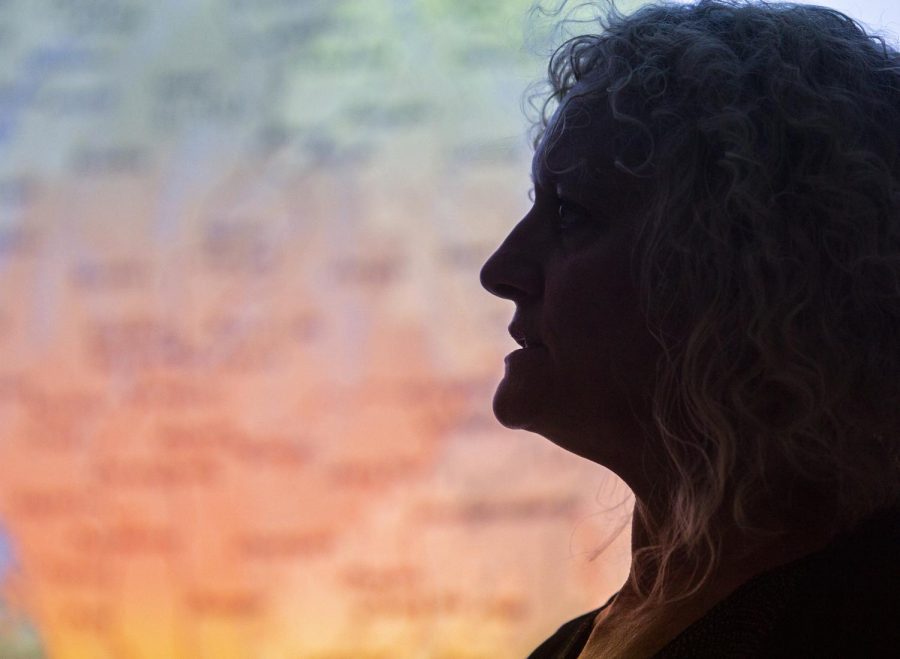SIU associate professor speaks about the role of Facebook on the conflict in Myanmar
Lisa Brooten giving a speech on the effects of social media on Myanmar, Thursday, Nov. 8 inside the University Museum. (Isabel Miller | @IsabelMillerDE)
November 14, 2018
At the University Museum Thursday evening, Lisa Brooten, an associate professor in the Department of Radio, Television and Digital Media, said 58 percent of mobile users in Myanmar live in rural areas.
Brooten said rural people moved from using radio as their means of information to cell phones.
“In Myanmar, the internet is Facebook,” Brooten said.
Advertisement
People will go to a store and get a phone that is already preloaded with a Facebook account, Brooten said. They don’t know the password, they just use it.
“If they lose contact, they just take it back to the cell phone shop and they reload it,” Brooten said. “The basic issue here is that there is really a lack of media literacy and familiarity.”
Brooten said questions that have emerged about social media over the last couple of years have been about Facebook’s size.
“Is it too big to manage? Is it too dangerous when it fails? Should the most important social infrastructure of the global community be managed by a single company headquartered in California,” Brooten said.
In Myanmar, these questions are especially important to ask. The country, located in Southeast Asia, is home to approximately 55 million people and is predominantly Buddhist.
Brooten said a report of an alleged rape of a Buddhist woman by Muslim men on Facebook sparked violence in Myanmar in 2012.
A study by the Institute of Human Rights and Peace Studies at Thailand Mahidol University found the rise of hate speech is often a precursor to outbreaks of anti-Muslim violence in Myanmar.
Advertisement*
Brooten said the rapid increase of social media gave rise to Buddhist nationalists extremist monks.
Ashin Wirathu was called the face of Buddhist terrorism by Time Magazine in 2013. She said he has been extremely successful in garnering support against the Rohingya among Buddhists.
“The world was very shocked by the idea of Buddhists who were very violent,” Brooten said.
In February 2018, as a result of all the violence and hate speech, Facebook removed Wirathu’s Facebook page.
Facebook responded to criticism in Myanmar by translating their community standards into Burmese.
“They did a very bad job of that by the way,” Brooten said. ”They also included prohibitions against hate speech and promotion of violence.”
Jessica Brown, an intern with the Southern Illinois chapter of the United Nations, came to take notes on Brooten’s presentation. Brown said she has been involved with the chapter for a couple months.
Brown said she believes people need to think about how social media outlets like Facebook affect society.
“I definitely think that the idea of Facebook potentially being more powerful or having as much power as a country is really interesting because it’s so big and so fast,” Brown said.
The United Nation chapter is celebrating the 70th year of the anniversary of the Universal Declaration of Human Rights with talks and an exhibit in the University Museum.
Olga Weidner, a past president of the United Nations chapter, said she believes every one of the 30 declarations makes a statement on what human rights are about.
“Everyone is entitled to those rights,” said Weidner. “And one of them referred to community environment to help develop an atmosphere that is receptive and inclusive and peaceful and safe for all who live there. We all have responsibility.”
Staff photographer Isabel Miller can be reached at imiller@dailyegyptian.com.
To stay up to date with all your southern Illinois news, follow the Daily Egyptian on Facebook and Twitter.
Advertisement







